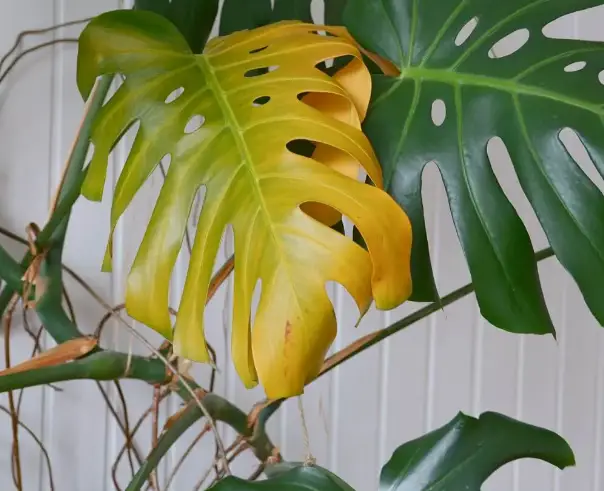8 Signs Of Over Watered Monstera Plants
The Monstera plant, otherwise also known as the Swiss cheese plant, is a tropical delight beauty that is known for its enormous, gleaming green leaves.
This is also an evergreen plant and is found locally in the tropical rainforests of South America and is a very famous plant choice for indoor plants among gardeners because of its ability to purify the air and its beauty.

The Monstera is not difficult to raise as it requires a little focus and it can flourish in various circumstances and even in low-light conditions also. Due to all this stuff, it’s a more likable plant among gardeners.
As monstera plants can grow in different temperatures and even in low light but they do not have the ability to grow on overwatering,
Sometimes overwatering may degrade the process of its growth, so nurturers or gardeners should take care of this, notice it, and should overcome it, as from my personal experience, I’m listing some of the signs that monstera shows in case you are overwatering it.
Below are some signs that monstera plants show if we are overwatering them.
1. Yellowing Or Withering Of Leaves
If your monstera leaves become yellow or shrink in size, it could be an indication of overwatering.
This is a sign that the plant is not getting a sufficient amount of oxygen from the soil, which leads the leaves to turn yellow & tanned hanging.
2. Soft Or Mushy Leaves
If you feel that your leaves are turning soft or mushy when you touch them, it may be a sign of overwatering them.
This is an indication that your plant is getting excess water in the soil & this can lead to leaf rot, which in turn causes the leaves to become soft and mushy.
so to make them back to normal make sure to trim off the mushy leaves as soon as possible and let them grow.
3. Root Rot
Overwatering these plants can lead to root rot, where in this situation the roots of the plants become waterlogged and they began to rot.
This root rotting degrades the plant’s growth and affects the plant’s stem which in turn whole plant to start degrading.
So if you guys are using pots for growing make sure you have proper drainage holes to clear them or even change the soil and let them dry.
4. Soggy Soil
Soggy soil is one of the most common and very well-known indications of overwatering plants.
This is a situation where the soil remains wet for a prolonged period, it’s also an indication that the plant is not getting sufficient oxygen and carbon, which in turn can lead to root rotting issues.
If you suspect that your Monstera is experiencing soggy soil problems, it’s important to act on this and address it & It’s good to quickly resolve the issue, by layering good soil over the soggy area and mixing it, making sure to water them in a suitable measure.
5. Fungal growth
Overwatering can lead to the growth of fungal or mold grow on the soil and even on the leaves of the plant. This is a sign that the plant’s environment is too moist, and it’s becoming hard for the plants to grow.
Fungus and mold can damage the plant by attacking its roots, in turn, this also leads to root rot. Mold can even cause dullness and decoloration of the leaves, and this in turn affects the overall appearance of the plant. If you suspect that your Monstera plants are experiencing fungal or mold growth.
It’s very much important to act on the situation and address the issues soon as possible.
6. Brown and black spots
If the leaves of your monstera plants have brown or black spots on them, this also could be a possible sign of overwatering.
These color pigmentations are common when you overwater them, so make sure to identify them sooner and trim the leaves with black and brown spots on them.
7. Foul Odor
A foul odor is another sign of your Monstera plants are experiencing an overwatering situation. When the soil remains consistently wet, this can lead to anaerobic bacteria and fungus growing on the plant’s soil surface.
These organisms grow very well in these types of situations, and as a result, they produce a foul smell.
These are commonly like as musty, sour, or rotting.
8. Stagnant Water And Slow Growth
You may even notice that soil will be wet for too long and stagnant water stays near the splat stem, these are also indicators of overwatering, if you notice stagnant water just remove them with water suckers or add fresh dry soil to fill the wet patch,
over the appearance of this situation causes slow growth of your monster
Frequently Asked Questions About Signs Of Overwatering The Monstera Plants
Q. How can I tell if my Monstera plant is overwatered?
A. There are a few signs from which you can identify that the Monstera plant is overwatered, which are Yellowing leaves, Mushy or smelly soil, Brown or black roots, Slow growth of plants, and Fungal growth.
Q. How often should I water my Monstera plant?
A. It depends on many things before you start watering monstera again make sure their soil is dry and not soggy and water during the night it will help to maintain moisture level. even check out the ways of watering monstera plants on our website to get more ideas.
Q. How can I prevent my Monstera plant from being overwatered?
A. Allow soil to dry out slightly between watering, Use a moisture meter to check its moisture level, make sure to have good drainage holes, and check the weather very often to prevent Monstera plants from being overwatered.
Q. Can I use fertilizer to revive my overwatered Monstera plant?
A. Fertilizer can help revive an overwatered Monstera plant, When you do decide to fertilize, use a balanced, water-soluble fertilizer. Make sure to follow the instructions on the fertilizer package and not to over-fertilize the plant.
Q. Can I save a Monstera plant that has been overwatered?
A. yes, many times it can be controlled & revive from overwatering, Keep in mind that the recovery process may take some time, it’s not uncommon for plants to take several weeks or even a few months to fully recover from being overwatered, but with proper care, it’s possible for the plant to bounce back.
Final Thoughts:
With the help of all the above signs I figured out I was over-watering my monstera plant. I also overcome this problem by limiting water and by doing other necessary actions for my plant.
